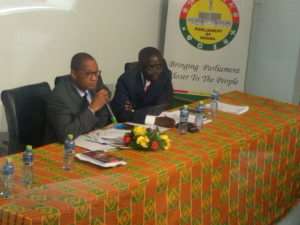
Some stakeholders at Thursday’s meeting in Parliament to discuss the Vigilantism and Other Offences Bill currently before the House, have expressed misgivings about the ability of the law to deal with the fundamental issues of politically affiliated militia groups in the country.
President Nana Addo Dankwa Akufo Addo, had to forward the Bill to Parliament through the Attorney General, Madam Gloria Akuffo ostensibly in an attempt to bring an end to politically related violence.
The Presidential move followed the violence that ensued the Ayawaso West Wuogon by-election where the issue about the upsurge of sophisticated forms of the phenomenon derails the country’s democratic process if left unchecked.
Some Members at the stakeholders meeting organized by the Constitutional, Legal and Parliamentary Affairs Committee, reveal that more consultation is required in order to make the fight against the phenomenon more effective.
For instance, a security analyst and international relations experts with the Kofi Annan International Peacekeeping Training Centre (KAIPKTC), Dr. Vladimir Antwi-Danso, was emphatic that the Vigilantism Bill, even if passed will still not work if frantic efforts are not made to ensure its enforcement.
According to him, there were enough legislations in the country, including the Criminal Offences Act, 1960 (Act 29) which could be used effectively to address the menace of vigilantism.
He added that for the Vigilantism and Other Related Offences Bill, 2019, to be effective and to achieve the purpose for which it has been developed, the institutional architecture of the state must be tweaked to make state institutions responsible for the enforcement of the law more independent of the appointing authority.
According to him, “We will get nowhere if institutions continue to patronize the government of the day,” adding that the trend had been so because the institutions clothed with the authority to enforce the laws were “at the beck and call of government.”
Speaking on behalf of the Civil Forum Initiative (CFI), a coalition of 28 different Civil Society Organisations in Ghana, Dr. Angela Dwamena-Aboagye noted among others that the Bill if given room will achieve the desired effect because of some serious gaps they have identified in the draft already.
She said the identified gaps including the root cause of vigilantism, impunity recruitment of party vigilantes into the national security set up, would make implementation of the law difficult.
One of the issues that featured prominently was the findings of the Emile Short Commission which has not yet been made public. A key resource which would enrich the content of the draft Bill.
The Forum also called on the government to address the underlining causes of mistrust between the political parties and the Police Service which seems to be weakening public confidence.
The Catholic Bishops Conference, have suggested that the passage of the Bill be delayed to allow for a broader and deeper stakeholder consultation before its passage.
Meanwhile, the Chairman of the Constitutional, Legal and Parliamentary Affairs Committee, Ben Abdella Banda, emphasised that the committee was racing against time to finish consultations on the Bill before Parliament resumes sitting on Tuesday, May 28, 2019 since the Bill is scheduled for swift attention in the next meeting of the House.




 There’s nothing you can do for us; just give us electricity to save our collapsi...
There’s nothing you can do for us; just give us electricity to save our collapsi...
 Ghanaian media failing in watchdog duties — Sulemana Braimah
Ghanaian media failing in watchdog duties — Sulemana Braimah
 On any scale, Mahama can't match Bawumia — NPP Youth Organiser
On any scale, Mahama can't match Bawumia — NPP Youth Organiser
 Never tag me as an NPP pastor; I'm 'pained' the 'Akyem Mafia' are still in charg...
Never tag me as an NPP pastor; I'm 'pained' the 'Akyem Mafia' are still in charg...
 Your refusal to dedicate a project to Atta Mills means you never loved him — Kok...
Your refusal to dedicate a project to Atta Mills means you never loved him — Kok...
 2024 elections: I'm competent, not just a dreamer; vote for me — Alan
2024 elections: I'm competent, not just a dreamer; vote for me — Alan
 2024 elections: Forget NPP, NDC; I've the Holy Spirit backing me and nothing wil...
2024 elections: Forget NPP, NDC; I've the Holy Spirit backing me and nothing wil...
 2024 elections: We've no trust in judiciary; we'll ensure ballots are well secur...
2024 elections: We've no trust in judiciary; we'll ensure ballots are well secur...
 Performance tracker: Fire MCEs, DCEs who document Mahama's projects; they're not...
Performance tracker: Fire MCEs, DCEs who document Mahama's projects; they're not...
 Train crash: Railway ministry shares footage of incident
Train crash: Railway ministry shares footage of incident
